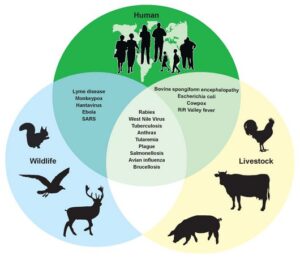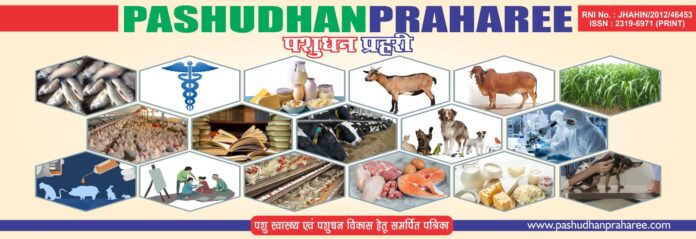Role of veterinarians and one health in the fight against zoonosis
Dr Sanjay Kumar Bharti1 & Aakriti Amit2
Head 1 & Student 2,Department of Veterinary Anatomy, Bihar Veterinary College, Bihar Animal Sciences University, Patna
Corresponding authors Dr S K Bharti- drskbharti24@gmail.com
“The health of humans depends on the health of animals” This statement might or might not have struck a chord with everyone a few years back, but the more the humanity progresses, the more unconventional threats it faces.
Zoonosis in simple terms is a disease which has jumped from a non-human animal to humans. The common layman assumption would be, if it affects an evolutionarily lower animal than it won’t affect me to that extent, but the world is fascinating. The earliest evidence of non- economically used pets comes from Iraq about 14000 years ago. Before that, people domesticated other animals like cattle, horses, sheep’s, and goats for economical purposes like meat, fleece, milk, eggs, etc., this was around 9000 BC. This simply shows that humans and animals have always been in a very close relationship, from the beginning of human civilization. First the domesticated animals were kept outside their homes, in the barns where a little distance was maintained, but as the years passed the close contact increased the animals shifted from barns inside their homes. They started living with them as family members. They are now completing many people’s lives as a companion; many use them as therapy to get over post traumatic stress disorders (PTSD). This brought other challenges in our lives as well.
The animals have a tendency to play around and not stay hygienic at all times, which is their natural behavior as they weren’t born to stay inside the premises and remain clean at all times. This makes them prone to many infections from various microorganisms or helminthes. They are in fact more prone to fall sick as compared to humans. The close contact makes humans vulnerable to those infections as well. This transmission of diseases from non- human animals to humans is what we are concerned about. This threat is growing everyday affecting millions of lives around the world.
We’ve had various outbreaks of various zoonotic diseases like plague, lyme disease, west nile virus, ebola, rabies, zoonotic influenza, etc. many pathogens begin as zoonotic pathogens but end up becoming only human strains like HIV, which was first seen in monkeys which then got transmitted to humans and spread quickly across the world and affects millions of people daily. The most recent viral outbreak has been so infectious that it has been given the title of a pandemic, novel- coronavirus, COVID-19. It started from bats like ebola did. It has managed to affect about 221 countries and killed about 45.5 lakh people and affected 21.9 crore people. The people who survived the virus ended up having various cardiovascular disorders for life. Many families were adversely affected and the trauma that would last generations to come.
If we observe closely there is no cure for these zoonotic disease outbreaks, we can only try our best to prevent them but we cannot vow to stop any further zoonotic diseases in future because of the close relationship between humans and animals is so co-existent that the humans might fail to survive without animals as human is an unapologetically dependant race. So “An ounce of prevention is worth a pound of cure” suits the best.

The best approach towards fighting the new zoonotic outbreaks is one health which is a program towards modifying the legislation, policies and research which targets the health of all the human and non- human animals for better coexistence. This plays a major role in preventing zoonotic disease outbreaks and sectors dealing with combating antibiotic resistance, which makes the researchers more prone or vulnerable to the bacteria. This can work only by the joint efforts of professionals and democrats with a range of expertise sitting all over the system that hold the power to change the lives and quality of life of even the people who aren’t even aware of the seriousness of the issue.
To effectively detect, respond to and prevent the worldwide spread of the diseases, the food safety problems, epidemiological data and laboratory information should be shared across all sectors for better functioning. Veterinarians play a very major role in prevention of these diseases as they deal with animals and people very closely. They can observe and diagnose the diseases in their patients and will notice if there is any spread of that particular infection to their respective owners as they happen to know the epidemiology of both the parties. This will help both the patient and the family to better understand and take precautionary measures to prevent further spread of that infection, if present. Veterinarians should schedule regular vaccinations of the animals accordingly. A little pondering brings us to the fact that veterinarians are the only and the best connecting link between animals and humans who are educated enough in that particular discipline to bring about a change. Veterinarians not only deal with domestic animals but wild animals as well so there is a wider range of knowledge and understanding available to them. As one famous veterinarian once said, to be a good veterinarian we need to love animals and humans as well.
It is a very common theory that maximum outbreaks start from tropical countries because of the favorable moist conditions provided to the microorganisms to flourish, which happen to be developing countries where healthcare is in a compromised state. These are the places where human health is ignored, let alone the health of non- human animals. This in one way or other hinders the quality research of professionals like veterinarians. This then comes down to the government officials to provide the funding and resources for the educational and research work for the professionals involved. After a veterinarian is made, the responsibility falls onto their shoulders to provide both successful and human services to the common public.
We being the responsible citizens of mankind can also bring about certain changes in our daily routine and habits that can help us in the long run. Starting off with the basics, washing hands regularly after touching any animal. Petting animals can be tempting and we shouldn’t stop ourselves from getting some extra endorphins, but carrying a sanitizer and always using it after goes a long way. We should also avoid coming in contact with strays that have not been vaccinated or dewormed. We should adopt strays and encourage others to do the same; this will give us a companion that we need and reduce the chances of that stray being a vector of various diseases. Going on regular veterinarian visits is very important for the animals and the animal parent.
Helen Keller once said, “Alone we can do so little; together we can do so much”. We can only think of changing the future of mankind un-united, but we can for sure change it by coming together and working our way through the adversities and spreading knowledge to the world for a better and sound future that we and the coming generations deserve. We not only should but we must work better as it is our responsibility to not let history repeat itself. We need to unite so that mankind doesn’t fall.
https://www.frontiersin.org/articles/10.3389/fvets.2020.576262/full


